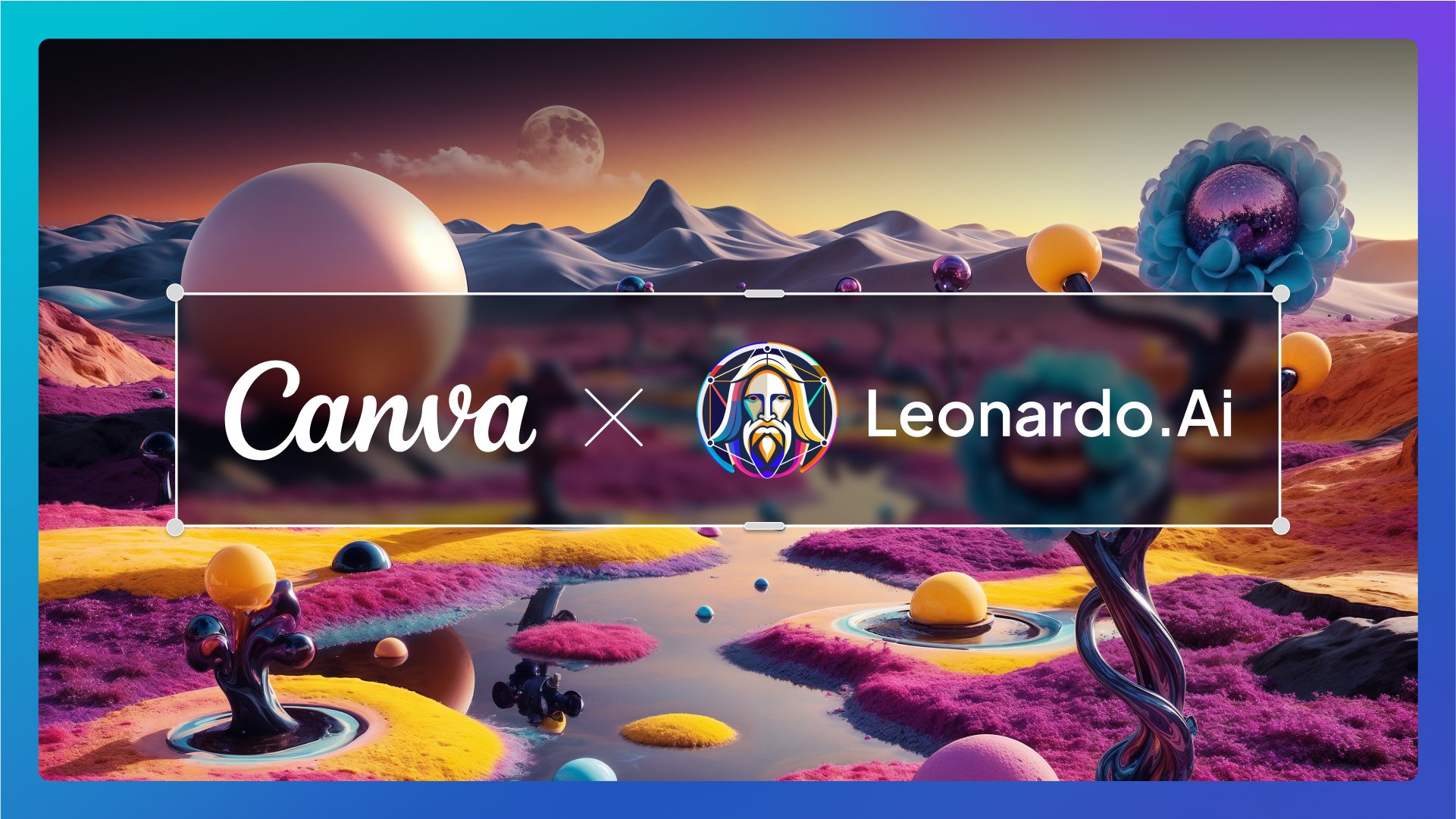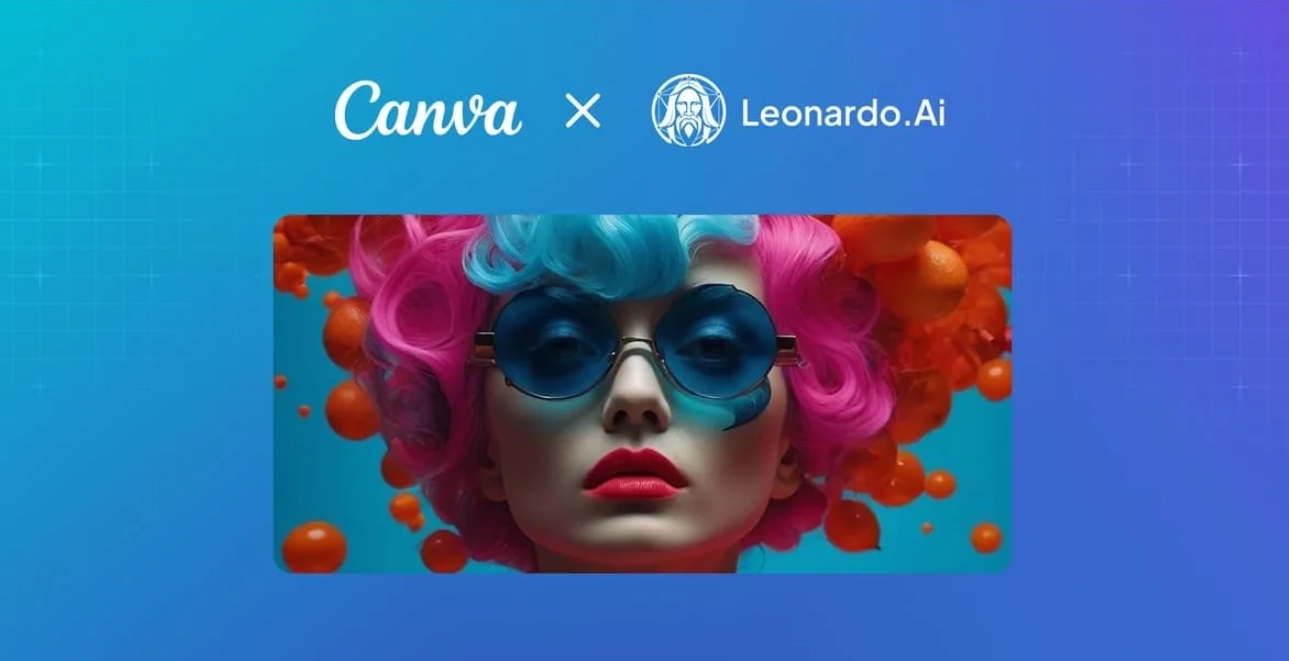Canva, a leading online design platform, recently announced its acquisition of Leonardo.ai, an artificial intelligence (AI) start-up specializing in generative AI technology. The move is expected to significantly enhance Canva’s AI capabilities, enabling the platform to provide users with more personalized and intuitive design experiences.
Leonardo.ai’s innovative technology uses AI to automate and streamline the design process, transforming text or data inputs into engaging visuals. By integrating this technology, Canva’s platform will be able to generate designs tailored to individual user needs, which could revolutionize how people approach design tasks.
Canva’s co-founder, Melanie Perkins, has expressed excitement about the acquisition, anticipating that it will allow the platform to continue to democratize design, making it accessible and easy for everyone. Integrating Leonardo.ai’s technology will also enable Canva to expand its offerings and further enhance its user experience, creating a more sophisticated and intuitive platform.
The acquisition is a strategic move for Canva, reflecting the company’s commitment to staying at the forefront of technological advancements in the design industry. The integration of Leonardo.ai’s generative AI technology looks set to provide Canva’s users with a dynamic and cutting-edge design experience.

Details of the Acquisition: What Canva Gains from Leonardo.ai
The acquisition of Leonardo.ai by Canva signifies an important step in the expansion of Canva’s capabilities in the realm of artificial intelligence and machine learning. Leonardo.ai, a startup known for its innovative AI technology, provides Canva with a unique opportunity to enhance its existing suite of design tools. The technology developed by Leonardo.ai enables users to convert sketches into digital designs effortlessly, a feature that can be seamlessly integrated into Canva’s platform, providing immense value to its users.
Moreover, Leonardo.ai’s technology can analyze and recognize the various elements in a design, such as shapes, colors, and fonts, and use AI algorithms to suggest improvements or modifications. This technology can be a game-changer for Canva, significantly enriching the user experience by offering personalized and intelligent design recommendations.
In addition, Canva stands to benefit from the talent acquisition that comes with this deal. The team at Leonardo.ai is comprised of individuals who are experts in AI and machine learning, areas where Canva is keen on expanding its expertise. Their knowledge and experience can significantly contribute to Canva’s pursuit of AI-integrated design solutions, driving the company’s growth and innovation.
Furthermore, the acquisition could potentially enable Canva to automate many manual design tasks, making the design process quicker and more efficient. This could attract a larger user base, including professional designers who value time-saving tools.
In essence, the acquisition of Leonardo.ai presents Canva with the opportunity to integrate sophisticated AI technology into its platform, enhance the user experience, expand its talent pool, and accelerate its growth in the competitive design software market. This strategic move underscores Canva’s commitment to continuous innovation and its vision to empower everyone to design anything and publish anywhere.
How Leonardo.ai Will Integrate with Canva’s Existing Tools
Leonardo.ai, an AI-powered technology, is geared up to take Canva’s design tools to a new level of efficiency and convenience. The integration of Leonardo.ai into Canva’s existing toolbox will revolutionize the way users perform tasks and create designs, making the process more streamlined and user-friendly. This advanced AI technology is equipped to comprehend the users’ design requirements and accordingly generate creative designs, thus saving a lot of time and effort.
Leonardo.ai’s collaboration with Canva will offer a more interactive platform where users can communicate their design ideas. It will then turn those ideas into tangible and visually appealing designs. This integration will enable users to get assistance with tasks such as logo creation, banner design, and other graphic design tasks, making the design process more accessible even for those with limited design skills.
Furthermore, the integration will also enhance Canva’s content creation capabilities. Leonardo.ai’s natural language processing abilities will allow users to generate content based on the design context. This means users will be able to create more personalized content that aligns perfectly with their design elements. The AI-driven technology will also help in automating repetitive design tasks, thereby increasing efficiency and productivity.
Additionally, the integration of Leonardo.ai will make Canva a more intuitive platform. The AI will continually learn from users’ inputs and feedback, thereby improving its understanding of users’ preferences and offering more personalized suggestions over time. This will not only make the design process smoother but also result in designs that precisely meet users’ requirements.
In conclusion, Leonardo.ai’s integration with Canva’s existing tools will transform the way users interact with the application, making it more intuitive, efficient, and user-centric. The integration will also pave the way for more innovative capabilities, offering an enhanced design experience to users.

Impact on Canva’s Generative AI Strategy and Future Plans
Canva’s adoption of Generative AI has significantly influenced its strategic planning and future ambitions. This innovative technology allows Canva to offer a more personalized user experience by automatically generating customized designs based on user preferences and behavior. The implementation of this AI-driven approach has not only streamlined the design process for users but also fueled Canva’s growth, helping the platform to scale and expand its user base rapidly.
Looking ahead, Canva plans to further integrate Generative AI into its services to enhance user experience and engagement. The company aims to leverage this technology to automate more design tasks, thereby enabling users to create professional-grade designs with minimal effort. This approach will also allow Can good to cater to a wider range of users, including those with no design experience.
Moreover, Canva intends to use Generative AI to offer personalized design recommendations. By analyzing user data, the AI can suggest design elements, color schemes, and layouts tailored to individual user preferences. This highly personalized experience is expected to increase user satisfaction and loyalty, thereby driving Canva’s growth and market share.
In addition to enhancing user experience, Canva’s Generative AI strategy also has implications for its business model. By automating design tasks, Canva can reduce its reliance on human designers, thereby lowering operational costs. Moreover, the ability to generate personalized designs at scale could open new revenue streams for Canva, such as premium subscriptions or services for businesses.
Overall, the integration of Generative AI is a strategic move by Canva that not only enhances its current offerings but also positions it for future growth and success. As Generative AI continues to evolve and improve, it will likely play an increasingly central role in Canva’s operations and strategy.
Industry Reactions: What the Acquisition Means for the AI Space
The acquisition certainly triggers a seismic shift in the AI space, creating both opportunities and challenges for industry players. The consolidation of AI technologies under the umbrella of a single entity could potentially streamline technological advancements, fostering an environment conducive to innovation and the development of cutting-edge solutions. The amalgamation may also lead to standardization in the sector, facilitating consistency and coherence in AI applications, thereby ameliorating the concerns related to fragmentation in AI technologies.
However, it also raises critical questions about market competition, dominance and diversity. Smaller AI companies may find it challenging to compete with the combined power and resources of the merged entities. There’s a potential risk of market monopoly, which may stifle innovation and limit choices for consumers. Furthermore, a single entity’s control could potentially result in a homogenization of AI technologies, possibly curbing diversity in AI solutions.
The acquisition also casts a spotlight on the issue of data privacy. A single entity’s unparalleled access to vast volumes of data could potentially raise concerns about data misuse or abuse. It is imperative for the acquiring company to demonstrate a strong commitment to data privacy and security, and for industry players and regulators to vigilantly monitor the entity’s data-handling practices.
In conclusion, while the acquisition holds promise for catalyzing technological advancements in the AI sector, it also necessitates careful scrutiny and management of potential risks and challenges. It underscores the need for a robust framework to ensure fair competition, diversity, and data privacy in the AI space. The industry’s response to the acquisition will be instrumental in shaping the future trajectory of the AI sector and determining its ability to harness the potential of AI while safeguarding against its risks.

User Benefits: New Features and Enhancements Expected from the Deal
The potential deal is expected to yield a plethora of advantages for users, bringing in a wave of new features and enhancements that will significantly improve the user experience. A crucial aspect of these improvements includes a heightened level of personalization. This implies that users will have the ability to customize their experience as per their preferences and requirements, thereby offering a tailored interaction.
Moreover, the deal is anticipated to introduce innovative features that involve advanced technology, potentially incorporating elements of artificial intelligence and machine learning, making the platform smarter and more intuitive.Users can also expect enhancements in terms of security and privacy controls, with the implementation of state-of-the-art measures to protect user data. The upcoming changes will also likely offer a more seamless and streamlined user interface, enabling easy navigation and usage. This is particularly beneficial for users who may not be technologically savvy, as it reduces complexity and makes the platform more accessible.
In addition to this, the deal also promises improved customer service and support, which will ensure prompt and efficient resolution of any issues or queries users may have. Furthermore, the introduction of new features and enhancements will also likely bring about a more integrated system, allowing for better synchronization with other platforms and devices. This integration would make the transition between different systems smooth and hassle-free for users.
The performance optimization is another significant aspect that users can look forward to, as it would lead to faster load times, and efficient usage of resources, thereby enhancing overall user satisfaction. The impending deal, therefore, promises a comprehensive upgrade, with a focus on delivering an elevated user experience through the introduction of new features and enhancements.
